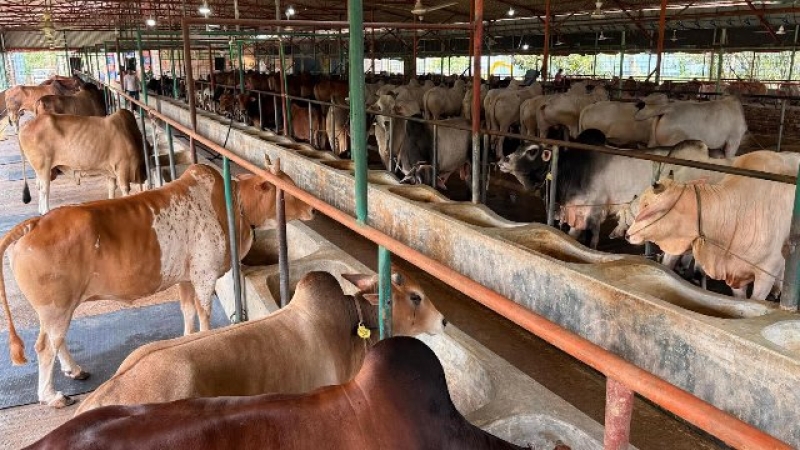- India Sees 9% Drop in Foreign Tourists as Bangladesh Visits Plunge |
- Dhaka Urges Restraint in Pakistan-Afghan War |
- Guterres Urges Action on Safe Migration Pact |
- OpenAI Raises $110B in Amazon-Led Funding |
- Puppet show enchants Children as Boi Mela comes alive on day 2 |
Feni farmers at odds to raise livestock ahead of Eid-ul-Azha

A cattle farm in Feni. UNB
By Shafi Ullah Repon
Feni, May 18 – Livestock farmers across Feni district are working tirelessly to rear and fatten cattle in anticipation of Eid-ul-Azha, with hopes of fetching fair prices in the upcoming sacrificial animal market.
Despite enduring a host of challenges, including rising prices of cattle feed, veterinary medicines and electricity, local farmers are navigating the final stretch before Eid, now less than a month away.
The enthusiasm, however, is tempered by concerns over market volatility and the potential impact of smuggled cattle from neighbouring countries.
Many believe that if cross-border cattle inflow can be curbed, local producers may finally break even or turn a profit.
Both buyers and sellers share the apprehension that the increased cost of feed will be reflected in this year’s cattle prices, which may dampen sales or reduce margins for farmers.
According to the District Department of Livestock, there is a surplus of sacrificial animals this year, similar to previous years.
The current demand for Eid-ul-Azha stands at 82,336 animals, while 87,227 have already been reared—comprising 69,360 cows, 1,667 buffaloes, 13,243 goats, and 3,147 sheep.
In comparison, last year saw a demand of 87,200, with a total of 90,250 animals reared.
Md Ibrahim, owner of Madina Agro in Fulgazi upazila, shared that his farm has about 200 cows this season, despite suffering setbacks during last year’s flood.
“The cost of cattle feed has increased significantly, which may be reflected in the market prices. If border smuggling can be prevented, farmers will see profits,” he said.
Local farmers continue to feel the lingering effects of the devastating flood that struck the district last year. They are hopeful of recovery if favourable conditions persist this season. Yet, concerns remain about a potential influx of smuggled cattle at the last moment, which could depress prices and threaten their livelihood.
Abdul Wahab Riyad Bhuiyan, another local farmer, pointed out that cattle smuggling via the border areas of Parshuram, Phulgazi and Chhagalnaiya continues year-round.
“If this continues, it could severely disrupt the Eid market,” he warned, urging stricter vigilance from law enforcement.
According to Border Guard Bangladesh (BGB), 123 Indian cattle were seized at various border points in Feni during March and April, with an estimated market value of Tk 68.55 lakh.
Lt Col Mohammad Mosharraf Hossain, Commanding Officer of BGB-4 Battalion in Feni, assured that there is sufficient supply to meet local demand.
“Efforts have been intensified to prevent illegal cattle smuggling across the border, in line with directives from higher authorities,” he said.
On the buyer side, Mohammad Arafat, a cattle farmer, said customers have already begun purchasing animals directly from farms, appreciating the hassle-free process. Some buyers are even making early purchases and leaving the animals in the care of the farms until Eid. “Buyers can use the live weight method to purchase animals based on actual body weight,” he noted.
Md Mozammel Haque, District Livestock Officer, confirmed there is no risk of cattle shortage this year. “In addition to over 5,000 registered farms, many individuals are also rearing one or more cattle privately,” he said.
To ensure smooth operations ahead of the festival, training is being provided to both professional and seasonal butchers. Awareness campaigns on leather preservation and marketing are also underway.
Veterinary medical teams are active from city to upazila levels, ensuring that only healthy animals are offered for sacrifice. “Officials are working to prevent any diseased cattle from being sacrificed,” said Mozammel.
Last year’s flood dealt a massive blow to Feni’s livestock sector. According to a report from the District Livestock Department, 38,731 cattle perished across six upazilas, including 129 buffaloes, 15,604 goats, and 356 sheep.
Besides, over 29.13 lakh livestock and poultry were affected, causing an estimated financial loss of over Tk 13.17 lakh. The disaster damaged 1,992 livestock farms and 1,623 poultry farms, resulting in a total loss of animals worth Tk 396.9 crore.
Despite the challenges, farmers in Feni remain hopeful that this year’s Eid market will offer them some relief and a chance to recover. - UNB

